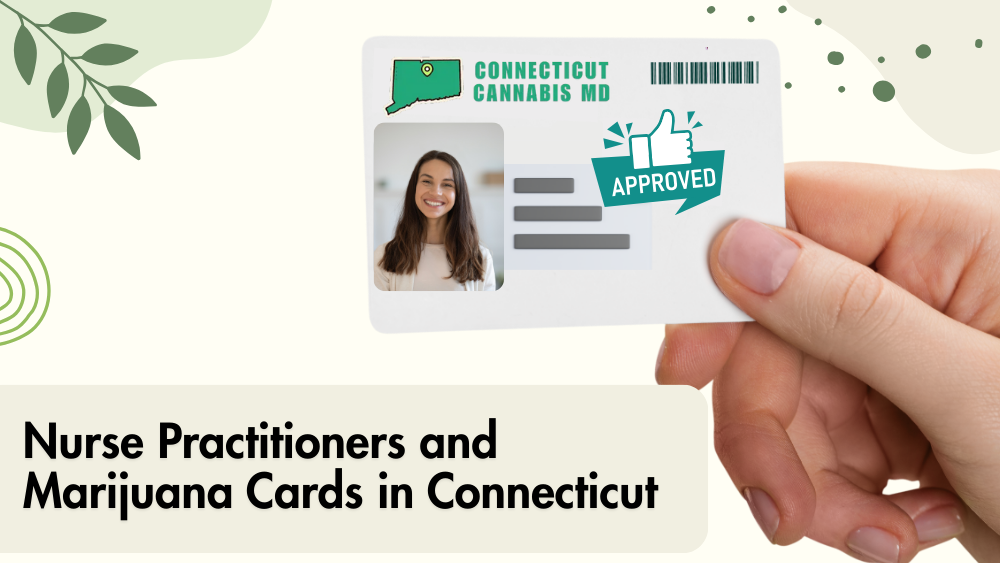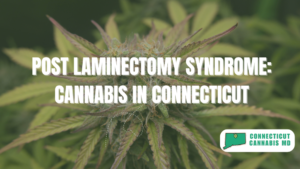Nurse Practitioners (NPs) play an essential role in healthcare, providing a wide range of services that include diagnosing and treating illnesses, prescribing medications, and offering holistic care to their patients.
In Connecticut, NPs are also authorized to certify patients for medical marijuana use. With medical marijuana becoming a more accepted form of treatment for chronic conditions, understanding the role of NPs in this process is crucial.
This article will explore how Nurse Practitioners in Connecticut can certify patients for medical marijuana cards, the legal framework surrounding medical marijuana use, and the professional considerations NPs should consider.
Additionally, we’ll explain the benefits of obtaining a medical marijuana card for patients and how NPs can guide them through the process.
With telemedicine consultations available for $179 for new patients and $149 for yearly renewals, certifying patients for medical marijuana has never been more convenient. Let’s explore the key aspects of this important role for Nurse Practitioners in Connecticut.
The Legal Framework for Nurse Practitioners and Medical Marijuana
Connecticut’s Medical Marijuana Program
In 2012, Connecticut legalized medical marijuana, which allowed patients with certain conditions to apply as registered patients. Nurse Practitioners and other licensed healthcare practitioners are also able to certify patients for medical marijuana.
After being certified, patients can take a medical marijuana card with them to any of the many licensed dispensaries and purchase cannabis.
The medical marijuana program is overseen by the Connecticut Department of Consumer Protection (DCP) as it sets state regulations and promotes adherence to the laws not only for patients but also for certified professionals.
Nurse Practitioners’ Authority to Certify Patients
Nurse Practitioners in Connecticut are allowed to assess patients and issue medical marijuana certifications for qualifying conditions. This jurisdiction is spelt out in state law and permits NPs to participate directly in the medical marijuana certification process. Nurse practitioners, along with doctors and physicians, as well as an array of other healthcare professionals, are all serving some sort of role in providing access to cannabis for medicinal reasons.
All Nurse Practitioners must be licensed and in good standing to practice as an APRN with prescriptive authority within the state of Connecticut prior to certifying patients.
This obligation encompasses reviewing the medical past of patients and their existing state, as well as checking if they are qualified to obtain marijuana for medicinal needs.
How Nurse Practitioners Can Certify Patients for Medical Marijuana?
Step-by-Step Certification Process
The certification process for Nurse Practitioners in Connecticut involves several key steps. These steps ensure that only qualified patients receive medical marijuana certifications:
- Patient Evaluation: The first step is a thorough evaluation of the patient’s medical condition. Nurse Practitioners must determine whether the patient has one of the qualifying conditions recognized by Connecticut’s medical marijuana program. These conditions include chronic pain, PTSD, cancer, epilepsy, glaucoma, and more.
- Telemedicine Consultation: Many Nurse Practitioners offer telemedicine consultations, making it easier for patients to access certification. During the consultation, the NP will review the patient’s medical history and assess their current symptoms. If the patient qualifies for medical marijuana, the NP will issue a certification.
- Certification Submission: Once the patient is certified, the Nurse Practitioner submits the certification to the Connecticut Department of Consumer Protection through their online portal. This allows the patient to apply for their medical marijuana card.
- Patient Follow-Up: Nurse Practitioners are responsible for monitoring their patients’ progress and ensuring that medical marijuana is effectively managing their condition. Regular follow-up appointments may be required to adjust treatment plans or renew certifications.
Qualifying Conditions for Medical Marijuana in Connecticut
Conditions That May Qualify for Certification
Connecticut has a specific list of qualifying medical conditions that allow patients to be certified for medical marijuana use. Nurse Practitioners must ensure that their patients meet the criteria before issuing a certification. Some of the most common qualifying conditions include:
- Chronic pain: Patients who experience long-term pain that is not adequately managed by traditional treatments may qualify.
- Post-Traumatic Stress Disorder (PTSD): Individuals with PTSD, especially veterans, often find relief through medical marijuana.
- Cancer: Medical marijuana is used to alleviate pain, nausea, and other symptoms associated with cancer and its treatments.
- Epilepsy and Seizure Disorders: Cannabis has been shown to reduce the frequency and severity of seizures in some patients.
- Multiple Sclerosis (MS): Patients with MS may use medical marijuana to manage muscle spasms and pain.
- Glaucoma: Medical marijuana can help reduce intraocular pressure in patients with glaucoma.
Nurse Practitioners should always consult the most up-to-date list of qualifying conditions as determined by the Connecticut Department of Consumer Protection.
Professional Considerations for Nurse Practitioners Certifying Patients
Maintaining Professional Standards
The law allows Nurse Practitioners to approve patients for medical marijuana, provided the following requirements are met: The assessment should serve as the basis for certifying a patient of medical necessity.
In the meantime, Nurse Practitioners should keep abreast of changes in medical marijuana research since using cannabis as medicine continues to expand. In this time of rapid changes, it is very important for NPs to stay informed regarding best practices so that they may guide the patients in their care.
Legal Considerations
Nurse Practitioners are required to practice within the bounds of Connecticut state law and federal regulation. While medical marijuana is legal in Connecticut, it remains a Schedule I drug federally.
Nurse practitioners should be prepared for conflicts between state and federal law, particularly in certifying patients who may receive cannabis.
Nurse practitioners working in any federally funded institutions or programs should take care, as it is against federal law to use marijuana for medical purposes. Make sure you know your workplace policies and the legal ramifications when certifying patients.
Benefits of a Medical Marijuana Card for Patients
Cost Savings
Cost savings are one of the main benefits of possessing a medical cannabis card But there are also conditions around the use of that tax-exempt cannabis, with heavy-duty tie-ins to state legal structures from ATM machines right through to edibles production. Over time, these savings can quickly add up for patients who need continuous treatment.
Access to High-Potency Products
In addition, medical marijuana patients can get greater potencies of cannabis than recreational consumers. For people with chronic conditions, especially those that require higher concentrations of CBD, a significant portion will be absorbed in the bloodstream through sublingual absorption, improving its bioavailability.
Nurse Practitioners will help patients choose the best products and dosing for their needs.
Legal Protections
Connecticut law provides legal protections for medical marijuana cardholders. Patients cannot be discriminated against by employers solely because they hold a medical marijuana card.
Additionally, cardholders are allowed to possess more cannabis than recreational users, giving them the flexibility to manage their conditions without fear of legal repercussions.
How Can Patients Get a Medical Marijuana Card?
Simple Telemedicine Consultations
The process is easy and streamlined for patients who want to get a medical marijuana card in Connecticut via telemedicine consultations. These consultations can be done online by Nurse Practitioners, so patients can complete them even from the comfort of their homes.
Telemedicine consultations to be certified for medical marijuana are usually 10–15 minutes long and consist of a review by the NP of the patient’s history (i.e. past ailments).
The certification can be received from a qualifying patient once approved, which will enable the subject to obtain an MMJ card via the Connecticut Department of Consumer Protection.
These consultations cost $179 for new patients, and only $149 every year brings some financial light to the surrounding circumstances, so consumers do not have to spend an arm-and-a-leg in order to try medical marijuana.
Conclusion: The Role of Nurse Practitioners in Medical Marijuana Certification
Connecticut Nurse Practitioners Play Crucial Role in Medical Marijuana Program Without a doubt, NPs play an invaluable role in the treatment of chronic conditions and pain across the country by certifying patients for medical marijuana. The whole process can be done online, with patients making easier access to care through telemedicine consultations.
The certification process is comprised of factors that include, but are not limited to, the following elements for Nurse Practitioners: adherence to professional standards, knowledge and awareness of legal considerations associated with practice as a health care practitioner, and provision of patient-focused or -centered health-care.
FAQs
Can Nurse Practitioners certify patients for medical marijuana in Connecticut?
Yes, Nurse Practitioners in Connecticut are authorized to certify patients for medical marijuana if they have a qualifying medical condition.
What is the cost of a telemedicine consultation for medical marijuana certification?
The cost is $179 for new patients and $149 for yearly renewals.
What conditions qualify for medical marijuana in Connecticut?
Conditions such as chronic pain, PTSD, cancer, epilepsy, multiple sclerosis, and glaucoma may qualify a patient for medical marijuana certification.
Are there legal protections for medical marijuana patients in Connecticut?
Yes, medical marijuana cardholders are protected from workplace discrimination based on their status and are allowed to possess more cannabis than recreational users.
How can I apply for a medical marijuana card in Connecticut?
After receiving certification from a Nurse Practitioner, you can apply for your medical marijuana card through the Connecticut Department of Consumer Protection’s online portal.












